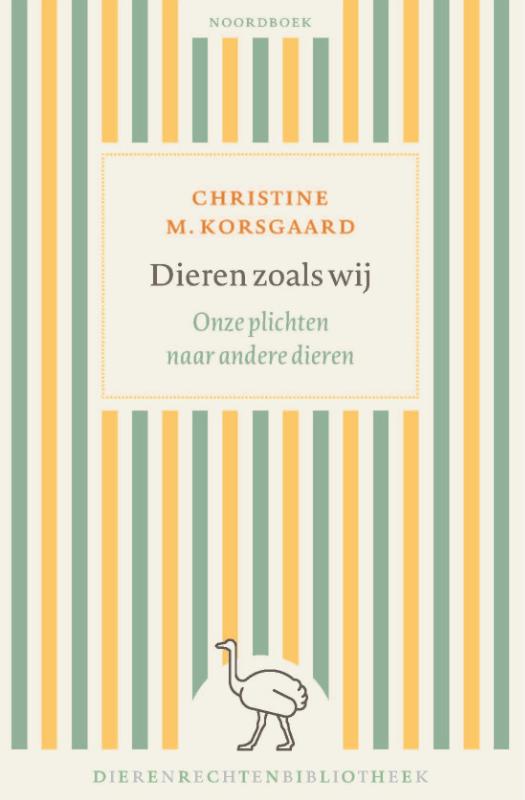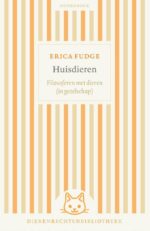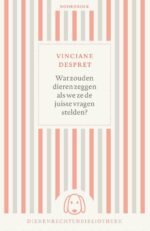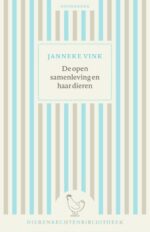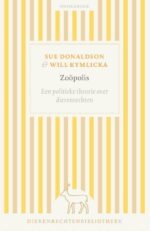Dieren zoals wij
€ 29,90
De Amerikaanse filosoof Christine Korsgaard ontwikkelt in dit boek een invloedrijke dierethiek. Ze gaat uit van het kantiaanse principe dat we dieren niet als middel mogen gebruiken voor onze eigen doelen. Dieren hebben eigen doelen. Het welzijn van elk voelend wezen horen we te behandelen als doel op zich, en dus als iets van absoluut belang.
Korsgaard veegt de vloer aan met de gedachte dat de mens belangrijker is dan de andere dieren, dat onze morele aard ons superieur maakt aan de andere dieren, en dat we door onze unieke capaciteiten beter zijn dan de andere dieren. Ze behandelt een aantal praktische vragen: of we het recht hebben om dieren te eten, ze in te zetten bij dierexperimenten, of we ze voor ons kunnen laten werken, of we dieren mogen inzetten in oorlogen, of we ze als huisdier mogen houden, en waarom het verkeerd is dieren te laten uitsterven.
Het nawoord bij dit standaardwerk is van GAIA-voorzitter en dierenactivist Michel Vandenbosch en filosoof Johan Braeckman.
Christine Korsgaard is emeritus hoogleraar aan Harvard University. Ze wordt beschouwd als een van de invloedrijkste filosofen van de laatste decennia.
Gerelateerde boeken
-
-
Wat zouden dieren zeggen als we ze de juiste vragen stelden?
€ 24,90Een must voor iedereen die met dieren werkt en een genot voor iedereen die al grinnikend wil begrijpen hoe dieren denken.
Staan koeien de hele dag te niksen? Maken vogels kunst? Kunnen apen werkelijk na-apen? Zien dieren zichzelf zoals wij hen zien? Kunnen ze in opstand komen? En — misschien een vreemde vraag — is het wel gepast om in hun bijzijn te plassen?
In dit boek beantwoordt de Belgische filosofe Vinciane Despret zesentwintig verrassende vragen die vastgeroeste ideeën over dieren op de proef stellen. Ze laat onderzoekers, filosofen en dierverzorgers aan het woord en laat zien hoe we anders over dieren kunnen denken.
Met een voorwoord van Bruno Latour en een nawoord van Michel Vandenbosch
Vinciane Despret is filosoof aan de Universiteit van Luik. Ze schreef meerdere boeken over dieren, waaronder Bêtes et hommes (Gallimard, 2007) en Penser comme un rat (Quae, 2009). -
De open samenleving en haar dieren
€ 32,50De wetenschap is helder: dieren hebben gevoel en bewustzijn. Ze hebben, net als menselijke dieren, bepaalde elementaire belangen. Om deze belangen mee te wegen, klinkt de roep om dieren tot rechtssubject te maken en hun een stem te geven in het recht en in de politiek.
Janneke Vink laat zien hoe verschillende landen omgaan met de veranderende status van het dier. Sommige landen, zoals Nederland, bungelen achteraan in de ontwikkeling, terwijl Zwitserland zo voorop wil lopen dat het over zijn eigen idealen struikelt. Verwijzend naar Karl Poppers ideaal van een staat waarin iedereen wordt gehoord, roept Vink op om dierenrechten stap voor stap in te voeren.
‘Een heldere en inzichtrijke verkenning van de diepgravende politieke en juridische onderwerpen die door de dierenbeweging op de kaart zijn gezet.’ – Peter Singer – Auteur van Animal Liberation en hoogleraar filosofie in Princeton
‘In dit innovatieve moreel-politieke en rechtsfilosofische boek toont Vink overtuigend aan dat niet-menselijke dieren een plek verdienen in ons rechtssysteem en dat hun belangen serieus horen mee te wegen. De liberaal-democratische beginselen vereisen het!’ – Robert Garner – hoogleraar politieke filosofie in Leicester
-
